NorCal Premier Soccer: Celebrating 20 Years
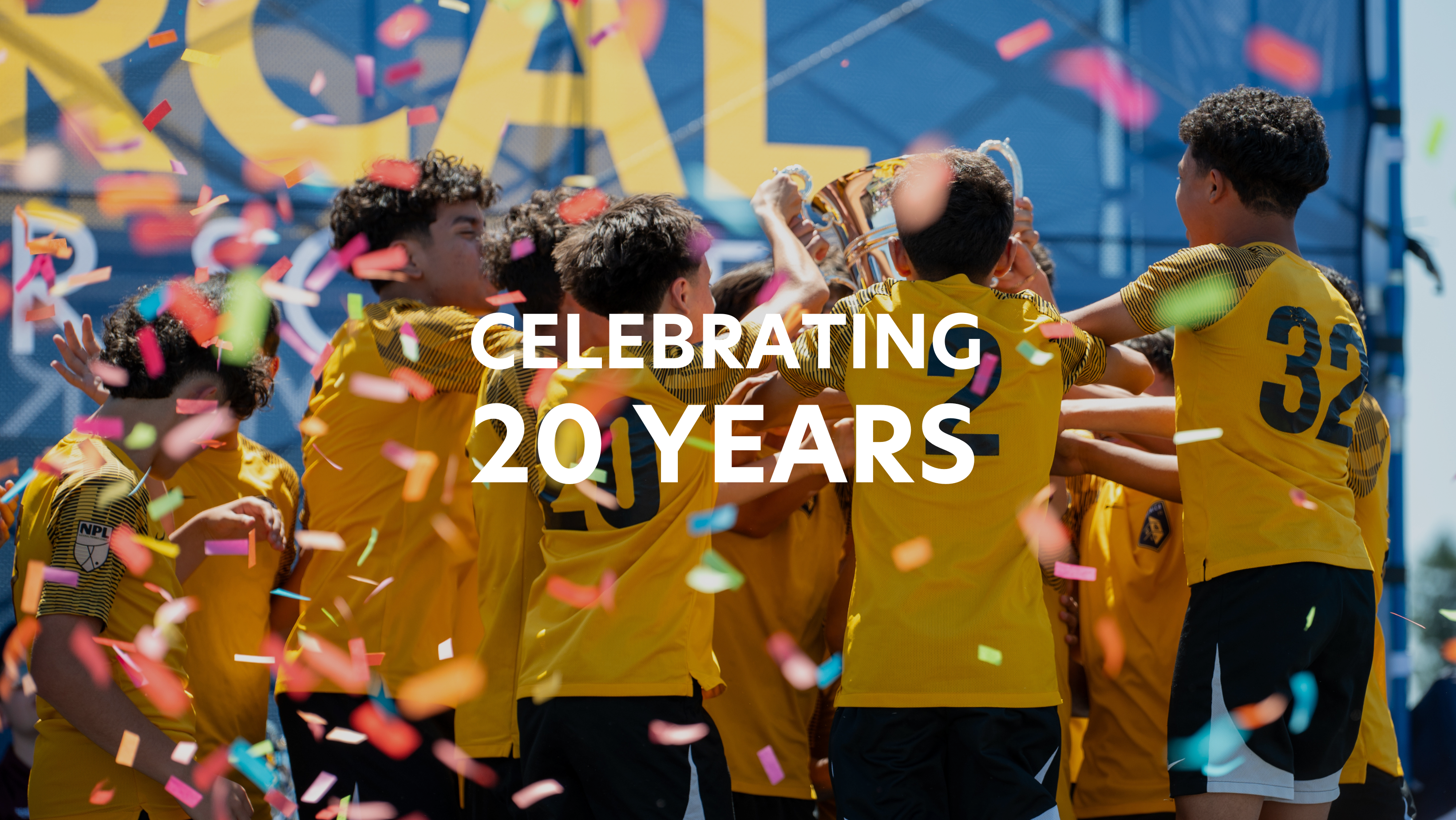

THE HISTORY OF NORCAL PREMIER SOCCER
Just after the turn of the century, Benjamin Ziemer, Shawn Blakeman, and Paolo Bonomo found themselves coaching high level youth soccer in Northern California, giving back to the game that had granted them so many blessings in life. Blakeman had just wound up a long career spent abroad, while Ziemer returned home after two seasons in Germany–both were part of an early American contingent trying to make it in Europe. Bonomo had grown up loving the game in Italy before relocating to the Golden State. Ziemer and Bonomo coached two of the top teams in the region, however, because they hailed from different regions, they hardly ever faced off. Nor did many of the top teams, at least not against each other. “We needed better competition,” Ziemer said. “But the existing governing body had a lot of rules and restrictions that kept us from having flexibility in the player development process.”
So Ziemer and Bonomo scheduled their teams to play each other and other clubs in spring friendlies, an idea that was met with instant backlash as one needed travel papers to play out of district during that time. This set into motion the first steps of what would eventually become NorCal Premier Soccer–the duo, alongside Blakeman, felt they could use the wealth of soccer experience within the Northern Californian soccer scene to collectively work with the directors of soccer clubs, to establish a better system for the beautiful game in California. “Soccer people, the coaches and directors, did not have a big enough voice in the decision making processes in youth soccer,” Ziemer said.
With these friendlies, the first steps were taken in creating a new soccer environment.
“There wasn’t enough access to spring club football for children under the current structure,” Blakeman said. “We blew that model up.”
THE FOUNDING
“The purpose of NorCal Premier Soccer shall be to foster the growth and development of selected soccer clubs throughout Northern California,” the original mission statement read. “We aim to improve the quality of the competition, coaching education, player development, referee development, and the overall enjoyment of the beautiful game.”
While NorCal’s scope would be broad and all-encompassing within the local youth game, the three co-founders articulated several core tenets that would set it apart from anything the country had seen before.
First, it was decided that the primary focus of a successful soccer program should be the individual players and their families, that clubs should focus on the development of children as people before their development as players.
Second, NorCal believed in simple administration, allowing for flexibility for each club to accomplish its goals as it saw fit–no two areas are the same, just like no two players are the same.
The purpose of promotion/relegation was defined next before the startup organization addressed changing the antiquated player pass rules that required a plethora of paperwork for simple roster changes, prevented players from advancing to a higher team within their own club, and frequently hamstrung teams who experienced a bout of sickness or had multiple players participate in a conflicting activity.
Furthermore, NorCal stated that it wished to expand the soccer season from its part-time status to year round, bringing the youth game in line with the rest of the world. Weekly competition, it was decided, alongside training and some breaks, was the best way for players to improve their craft.
Finally, the startup believed in supporting the pursuit of high-level activities, giving common sense autonomy to families who could then decide which club their children played for, and the idea that fun remains paramount in youth sports. “We believe soccer is a kick in the grass, a blast, loads of fun, the cat’s meow, the bee’s knees, and the world’s favorite pastime,” the mission statement concluded. “(It) should be played, watched, enjoyed, and read about daily.”
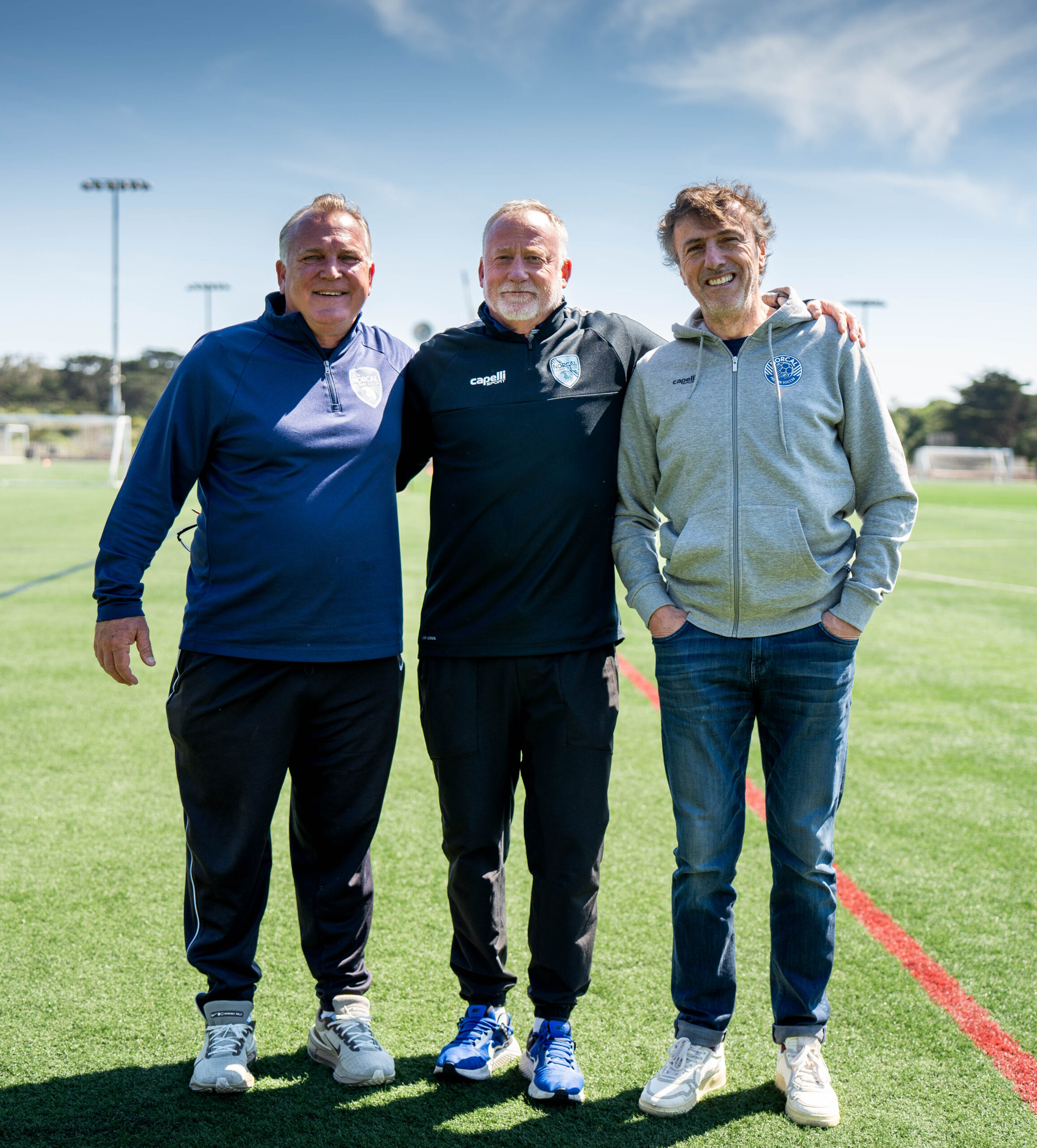
Bonomo, Blakeman, and Ziemer would serve as the original Board of Directors and agreed on two stipulations: they would do so on a voluntary basis to start and anyone who hoped to join the board in the future was required to have lived or studied the beautiful game abroad at some point in their lives.
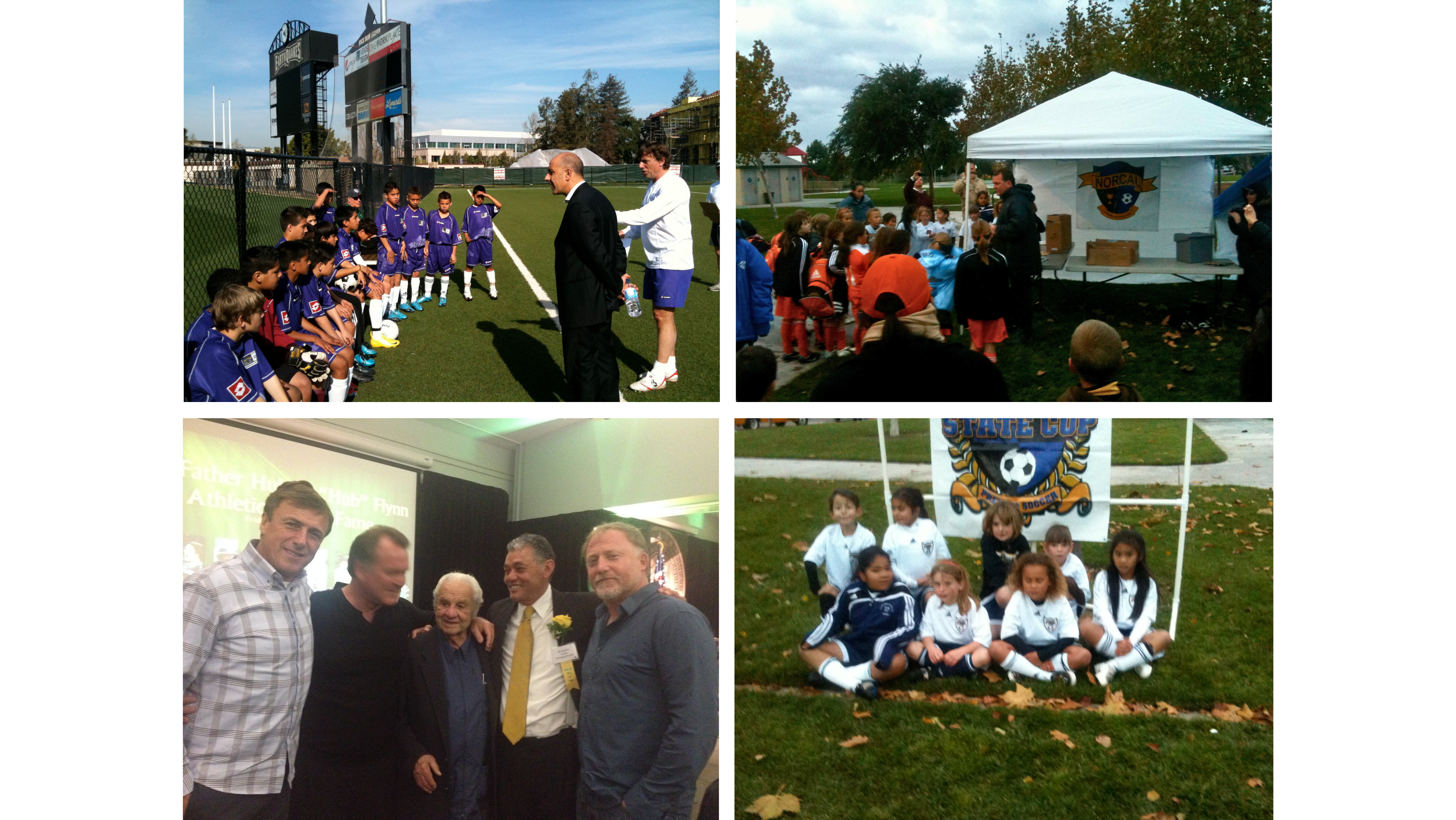
By spring of 2004, the new non-profit, NorCal Premier Soccer, had bylaws, a loose structure, a league season, and roughly 120 teams to participate at the U11-U13 age groups for boys and girls. Instead of grouping teams purely by geography, the three co-founders believed in instituting a merit-based system of play. Harkening on their European experience, NorCal instituted promotion and relegation into the youth game, ensuring the competitiveness of each match, which would only further drive development. The competitions would be sanctioned by US Club Soccer, a fellow up-and-coming organization with similarly progressive values.
EARLY HURDLES
Within three months of the first league season, NorCal held its first-ever meeting between all of its clubs’ Directors of Coaching–the first time such a gathering had taken place in Northern California. After the spring, a multi-tiered State Cup modeled after the UEFA Champions League, UEFA Cup, and UEFA Cup Winners’ Cup was introduced and NorCal’s competitions were up and running. However, the nascent organization faced several challenges in establishing itself as a major player in the game.
Early on, several clubs bought in, but even more didn’t. Many chose to wait to see if NorCal could establish a significant foothold in the landscape.
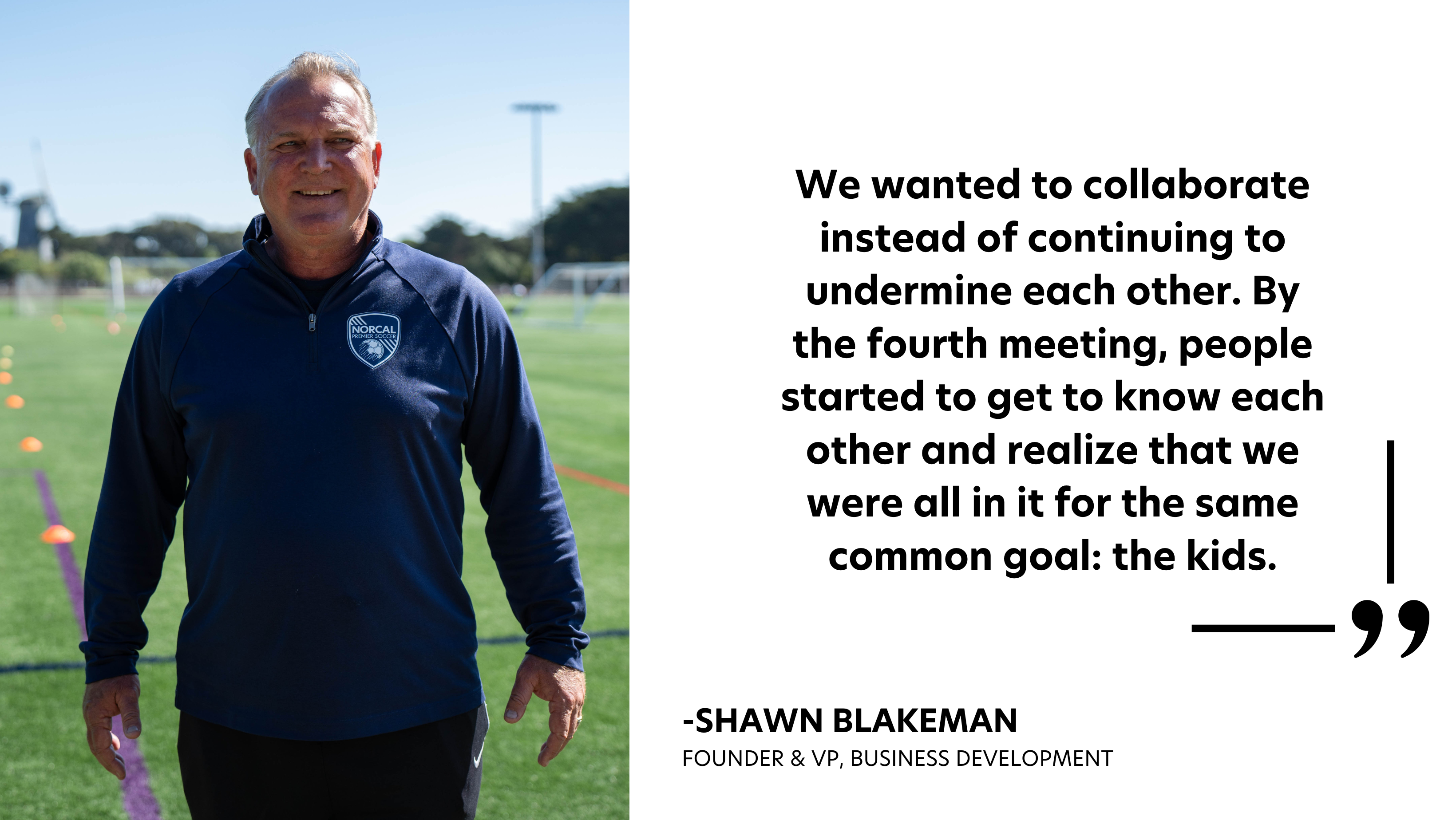
That’s where Blakeman stepped in along with other key players in making Region 6–the Sacramento area–a major platform for innovation. Alongside other representation from his club, Sacramento United, Blakeman began a dialogue with his once rivals in the form of monthly meetings. “We wanted to collaborate instead of continuing to undermine each other,” Blakeman said. “By the fourth meeting, people started to get to know each other and realize that we were all in it for the same common goal: the kids.”
Through Blakeman’s leadership, nearly every Region 6 club agreed to join shortly, allowing the collaboration to continue to the next phase. Ziemer and Bonomo worked on shoring up their local areas while pointing to the Sacramento area’s success as an example of what Regions 1-5 should emulate. Blakeman and Sac United started hosting coaching symposiums, exchanging ideas on best practices, building up the grassroots game, and scheduling club trips to study the game in Europe.
“On that first flight back from Europe,” Blakeman said, “everyone told me that they finally understood what NorCal was all about. It changed a lot.”
PLAYER DEVELOPMENT PROGRAM
While NorCal couldn’t solve all of the issues surrounding American youth soccer overnight, it could at least offer some of its top players a free-of-charge, top-level environment to further their development. Because each of the co-founders volunteered for the first seven years of the organization’s history, NorCal was able to re-invest much of its revenue into several different aspects it hoped to change. From day one, the startup strived to establish a Player Development Program that differed with similar initiatives run by rival leagues in that the players wouldn’t pay a dime to take part.
“In traditional programs, all the best players could pay,” Bonomo said. “We saw this as flawed.”
PDP’s first event was a talent ID camp, hosted during the summer of 2005 as a way for the program’s decision makers to familiarize themselves with the local talent. Those who wished to coach also started as volunteers, with the funding spent on bringing in the players as well as inviting development experts such as then Chivas USA Sports Director Dennis te Kloese. To help build out the program, Blakeman, Bonomo, and Ziemer visited a U.S. U17 National Team camp to pick the brains of USSF coaches and scouts about how they organized a selection-style program and what qualities they looked for in players.
In 2006, PDP took its first of what has now become an annual trip to play in a quality competition when a team led by current San Jose Earthquake Tommy Thompson flew to Italy for a series of matches. As the program grew more traction, it expanded, branching down to the regional levels and in 2009 establishing a calendar with set events and regular play.
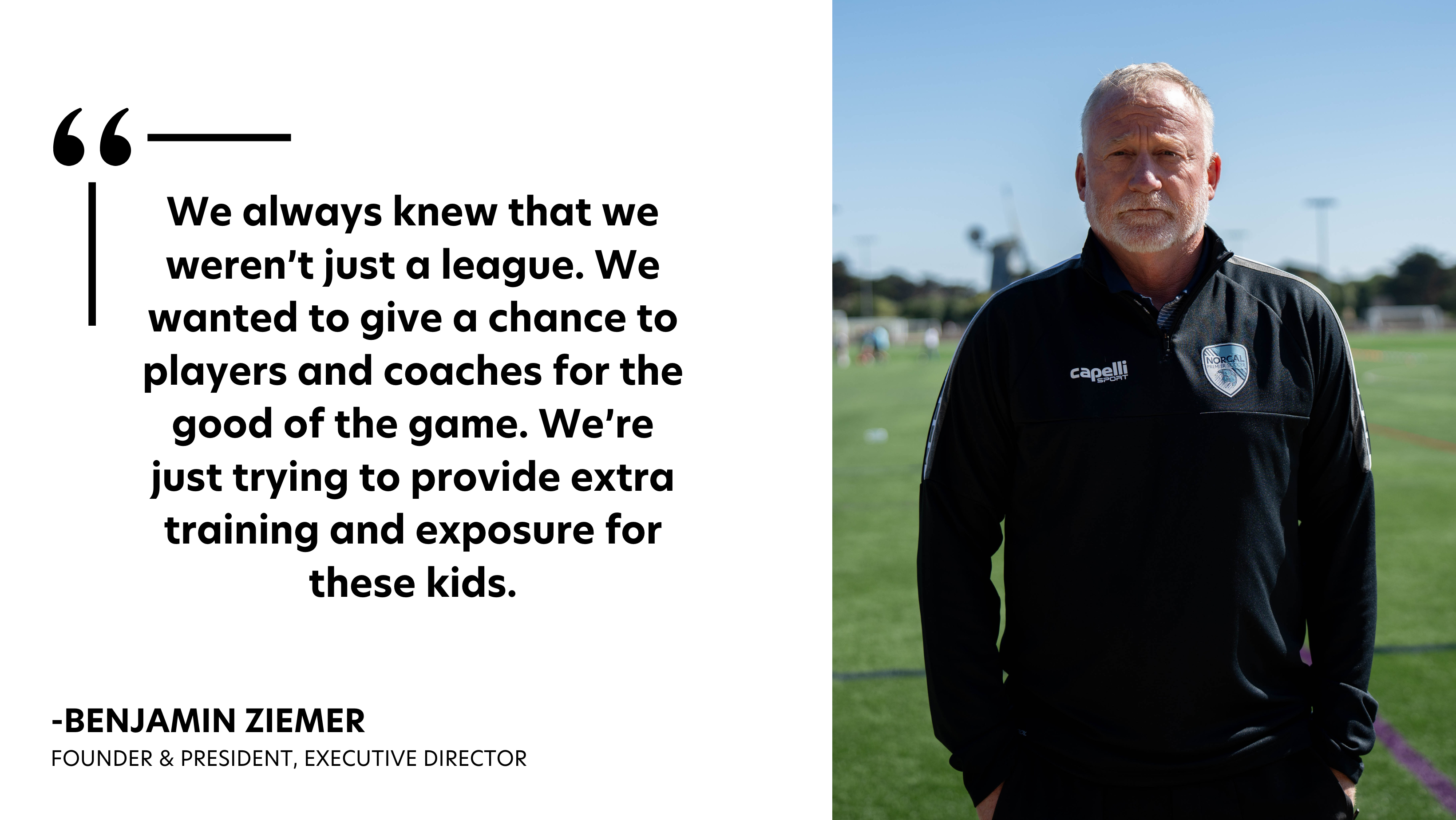
“We always knew that we weren’t just a league,” Ziemer said. “We wanted to give a chance to players and coaches for the good of the game. We’re just trying to provide extra training and exposure for these kids.”
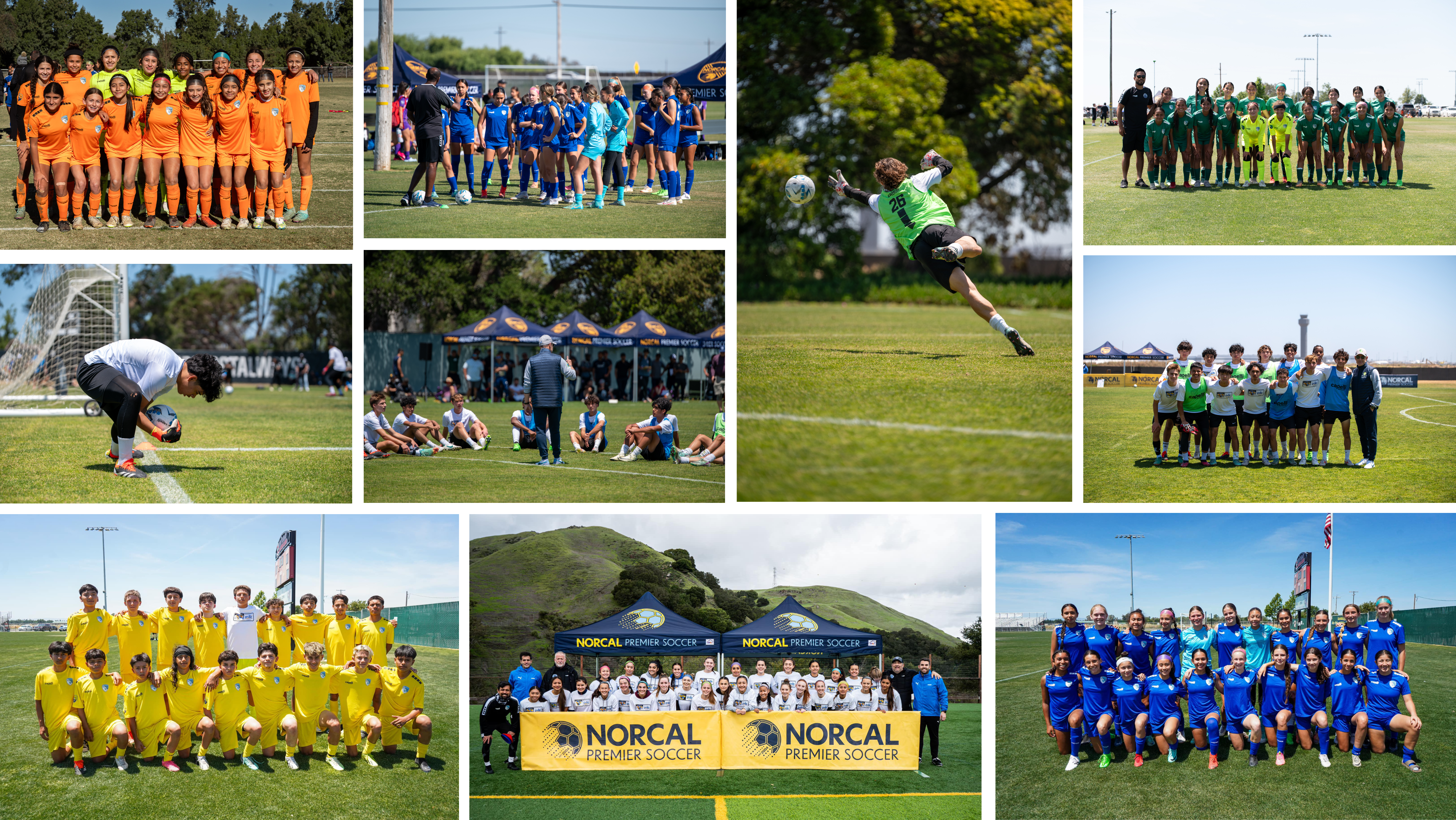
After nearly two decades, the program has come full circle, with dozens of graduates plying their trade professionally. During Major League Soccer’s 2024 opening match between Inter Miami CF and Real Salt Lake, three different NorCal PDP alums shared the pitch with Lionel Messi and his star-studded supporting cast: Fidel Barajas, Drake Callender, and Diego Luna. A few days earlier, fellow program alum Maya Doms scored the first goal in franchise history for 2024 NWSL expansion side Bay FC.
“PDP isn’t the reason these players advanced to the professional ranks,” Ziemer said. “But it certainly helps that from a young age they’re exposed to different training environments with motivated players, and top level coaches.”
CHANGING COACHING EDUCATION
In addition to putting money back in the community through PDP, since its inception, NorCal Premier Soccer has also invested in fully or heavily subsidized coaching education on a regular basis. NorCal believes that better coaches make better players, making improving the standard of the average youth coach imperative.
To coincide with the first State Cup finals, company leadership organized NorCal’s first-ever Directors of Coaching course, with education provided by former Ajax and FC Barcelona goalkeeping coach Frans Hoek. A disciple of legendary player and coach Johan Cruyff, Hoek was NorCal’s original big-name clinician. Hoek remains involved in NorCal’s coaching education program to this day, and has been joined by many more influential voices throughout the years in presenting to any local coach who has desired to improve their craft, at little or no cost.
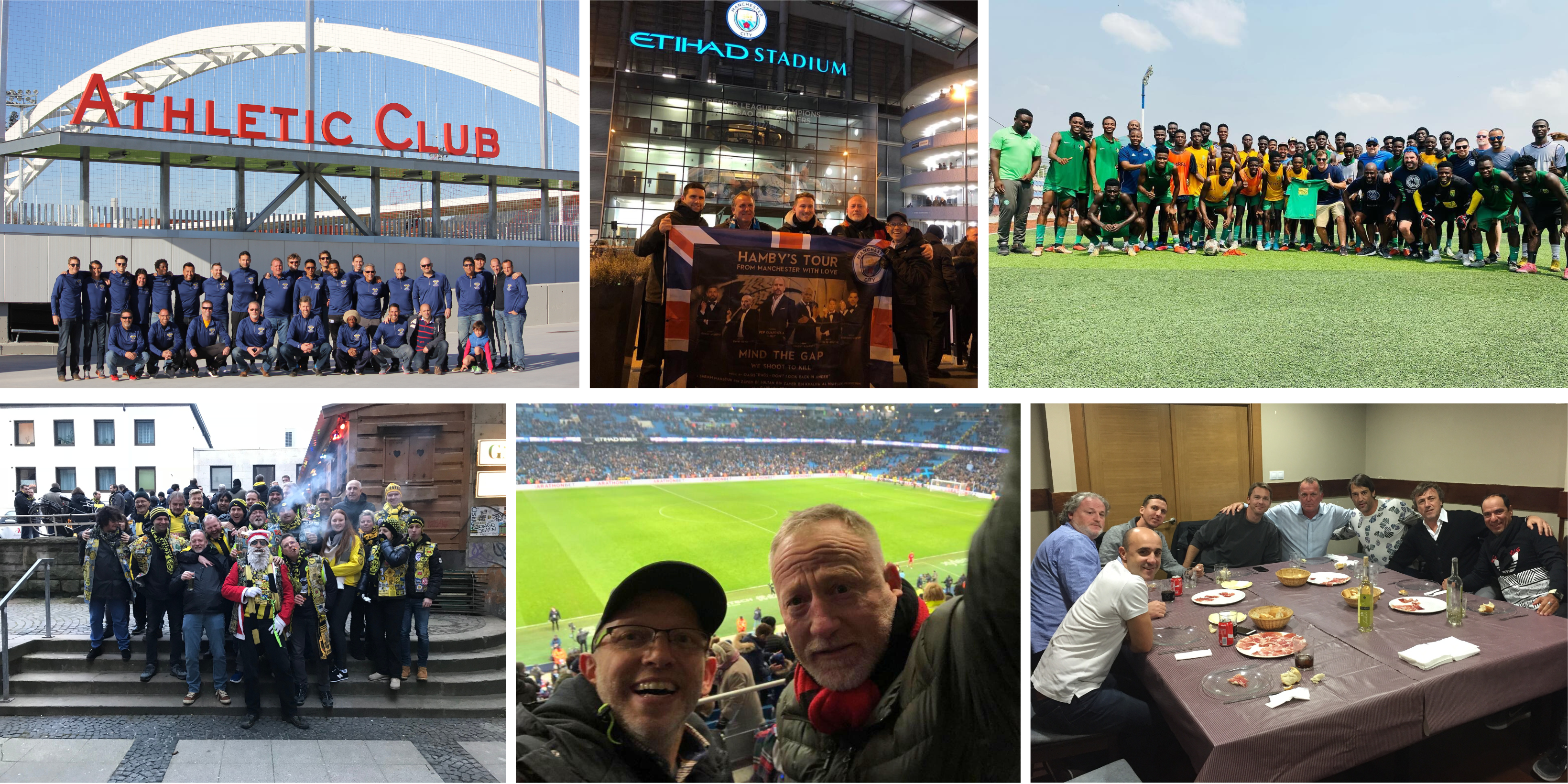
A series of successful regional education opportunities built up to the inaugural coaching tour abroad, which took place in Italy and the Netherlands in December 2007. Since then, NorCal has tried to organize at least one such trip each year, with dozens participating in several voyages to Western Europe or Latin America. In early 2024, the organization visited Africa for the first time in an official capacity, visiting the famous Right to Dream Academy in Ghana and the Africa Cup of Nations in Côte d’Ivoire.
During the first European trip in 2007, the co-founders secured informal partnerships with Italian clubs Calcio Padova and LR Vicenza, which paved the way for a more structured relationship with ACF Fiorentina. The inroads built in Italy resulted in the famed Serie A side traveling to Northern California for coaching education each year for more than six years. “When visiting Fiorentina, we realized one aspect lacking in player development in the US was the physical development and coordination aspects,” Ziemer said. “Fiorentina told us we were a gold mine of talent from ages 11-12, but after that our players were ‘dying on the vine.’”
These were the first of several budding relationships that allowed NorCal to blossom thanks to multinational information exchange. Cultivating those relationships have allowed member coaches to learn from some of the best youth development setups in the world including Ajax, Athletic Bilbao, Atlas, AZ Alkmaar, Bayer Leverkusen, Borussia Dortmund, Borussia Monchengladbach, Benfica, Chivas, Espanyol, FC Barcelona, Feyenoord Rotterdam, Independiente, Necaxa, Newell’s Old Boys, PSV Eindhoven, Racing Club, and more.
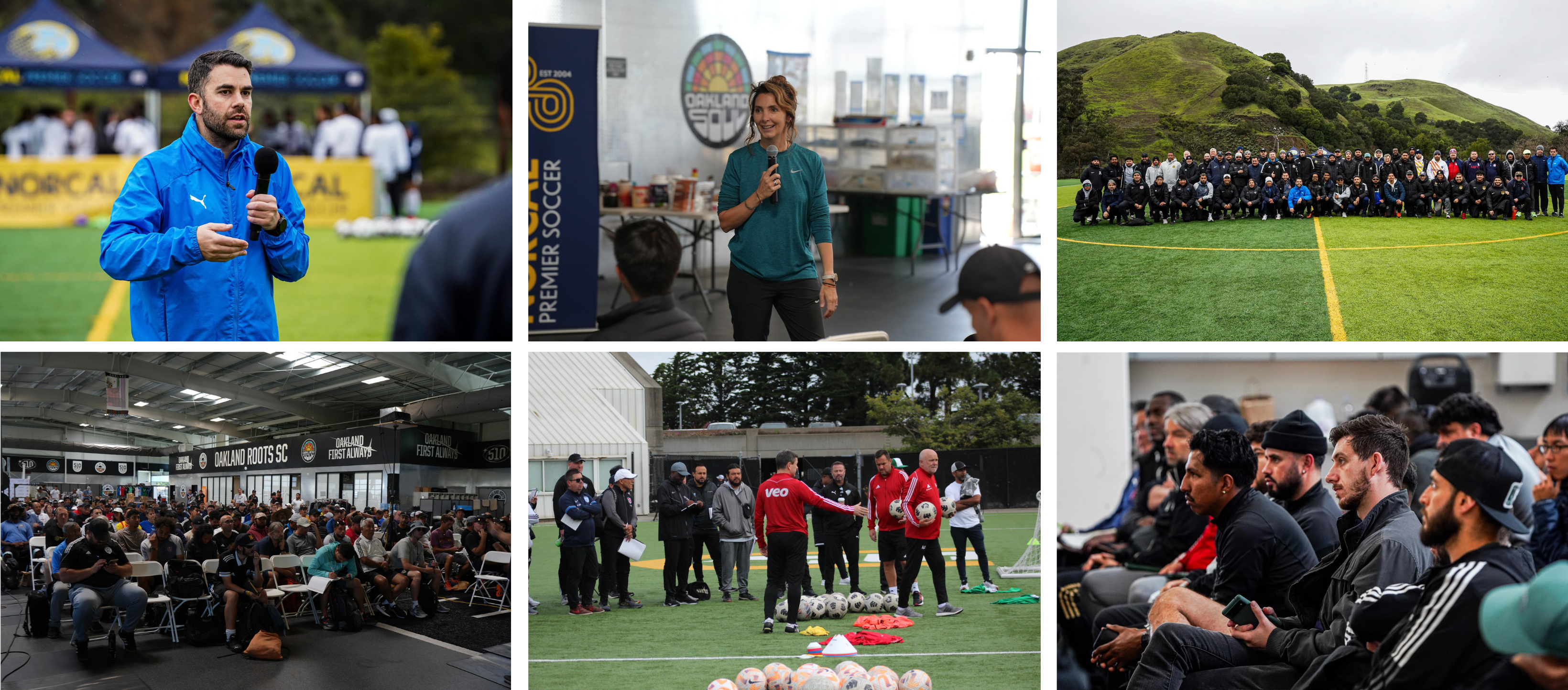
In addition to hosting several local coaching education opportunities throughout the year, NorCal arranges a symposium every summer to gather the entire community together with a diverse array of clinicians. Last year’s instructors included Hoek, former FC Barcelona Femeni Manager Lluis Cortes, UCLA Head Coach Margueritte Aozasa, and Olympique Lyonnais Femenin Team Manager Julien Legrand.
EXPANDING REFEREE OPPORTUNITIES
When NorCal Premier Soccer began operations, finding enough qualified referees proved to be a huge challenge. This challenge hasn’t gone anywhere, as officiating remains a tough job with a high turnover rate. However, back in the organization’s formative years, there were prospective young refs who wished to earn their certifications or advance their education, but were blocked by outside forces.
When one NorCal coach attempted to gather materials to help certify new officials, and by consequence help grow the game nationally, he was denied. Instead, he was forced to reach out to USSF to satisfy the demand, finding his solution halfway across the country instead of in his own backyard.
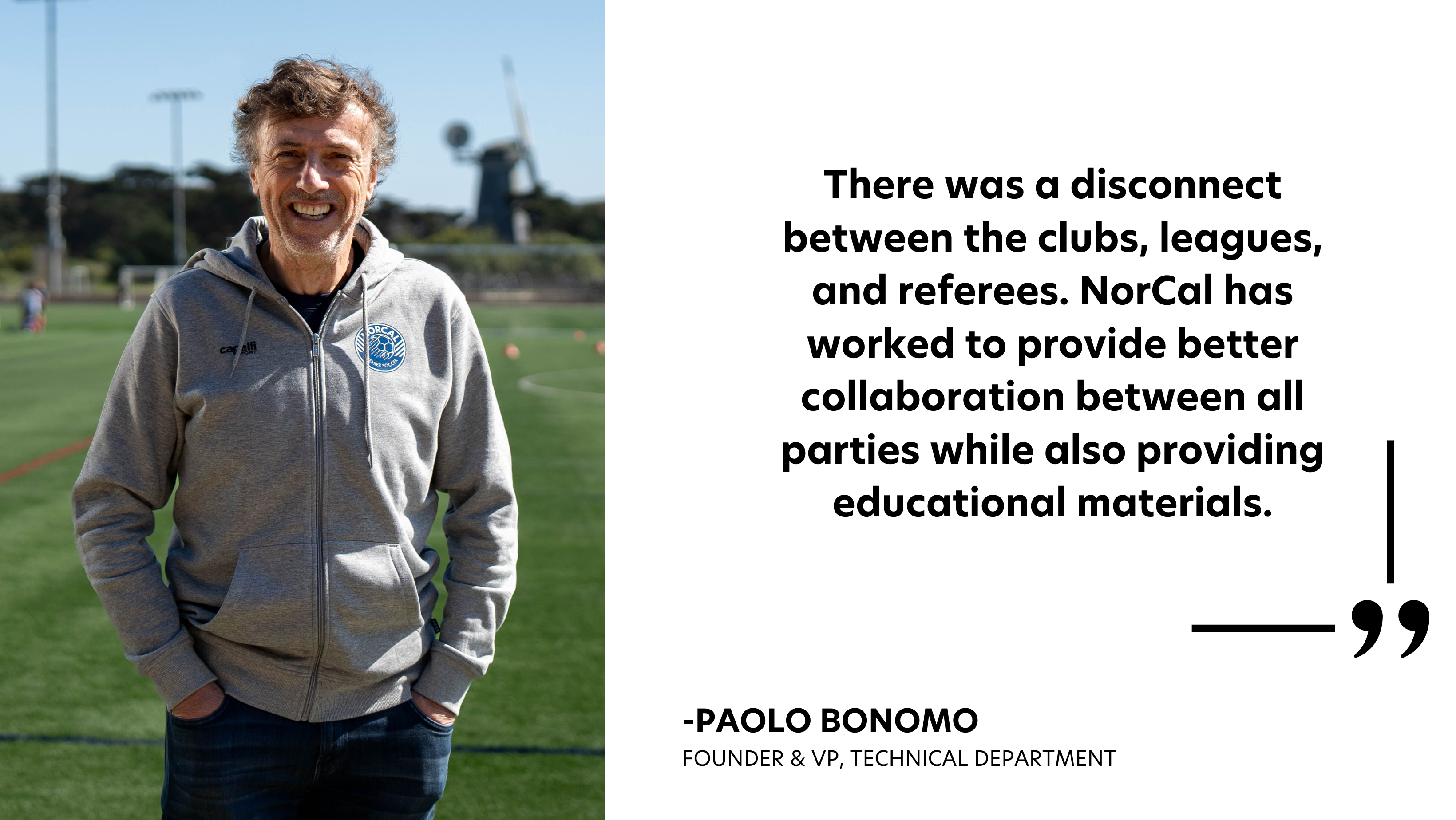
“There was a disconnect between the clubs, leagues, and referees,” Bonomo said. “NorCal has worked to provide better collaboration between all parties while also providing educational materials.”
Referees are essential to the game, which is why from the beginning, NorCal has also re-invested its funds into education for the officials.
FURTHER INVESTING
The official NorCal Premier Soccer grant process didn’t begin until roughly 10 years ago, but from the start, NorCal helped provide financial resources to many of its clubs in order to increase the widespread availability of the sport and a healthy membership to go along with it. Whether it involved waiving certain fees, providing financial aid to players who lacked the means, supporting basic club functions, scheduling games, or lining fields, NorCal has always taken steps to increase the availability of access to football.
The tradition of providing financial aid has continued, though with a much clearer application process. In 2023, NorCal offered up to $4,000 to each club applicant that met the grant criteria–half towards waiving league fees, with the other half going towards equipment purchases from organizational partners. In addition to providing much-needed resources, the grants come with stipulations designed to benefit recipient clubs and the level of soccer in the State–those who receive aid are required to attend NorCal’s coaching education opportunities and Club Development Seminars. Overall more than $100,000 have been given out to deserving clubs through this process.
INTERNATIONAL RECOGNITION
Thanks to a forward-thinking competition structure, an emphasis on coaching and refereeing development, and subsidized programming, NorCal Premier Soccer earned national relevance early on in its history. And while NorCal has remained relevant in the United States, it began to make a name for itself on the world stage in the last decade.
After initially sending its “State Team,” the top-18 U17 boys and girls in Northern California, to tournaments like Surf Cup, NorCal began seeking to test itself internationally. In 2017, as the boys side made a run to the semifinals of the Copa Chivas in Guadalajara, the girls traveled to Sweden to compete in the Gothia Cup, the largest youth soccer tournament in the world. While any team can enter some form of the competition, just a select few are allowed into the Puma Trophy, a special invite-only bracket featuring some of the most prestigious youth development programs in the world.
In its inaugural foray into the Puma Trophy, the NorCal girls dominated, defeating IF Limhamn/Bunkeflo 3-0 in the final. The squad followed that performance by qualifying for the championship game in the next five editions, a streak that remains current as the 2020 and 2021 tournaments were both canceled. In 2022, the NorCal girls captured their second Puma Trophy, defeating Bayer Leverkusen 2-1 at Gothenburg’s Gamla Ullevi Stadium, the location of the city’s most successful professional club.
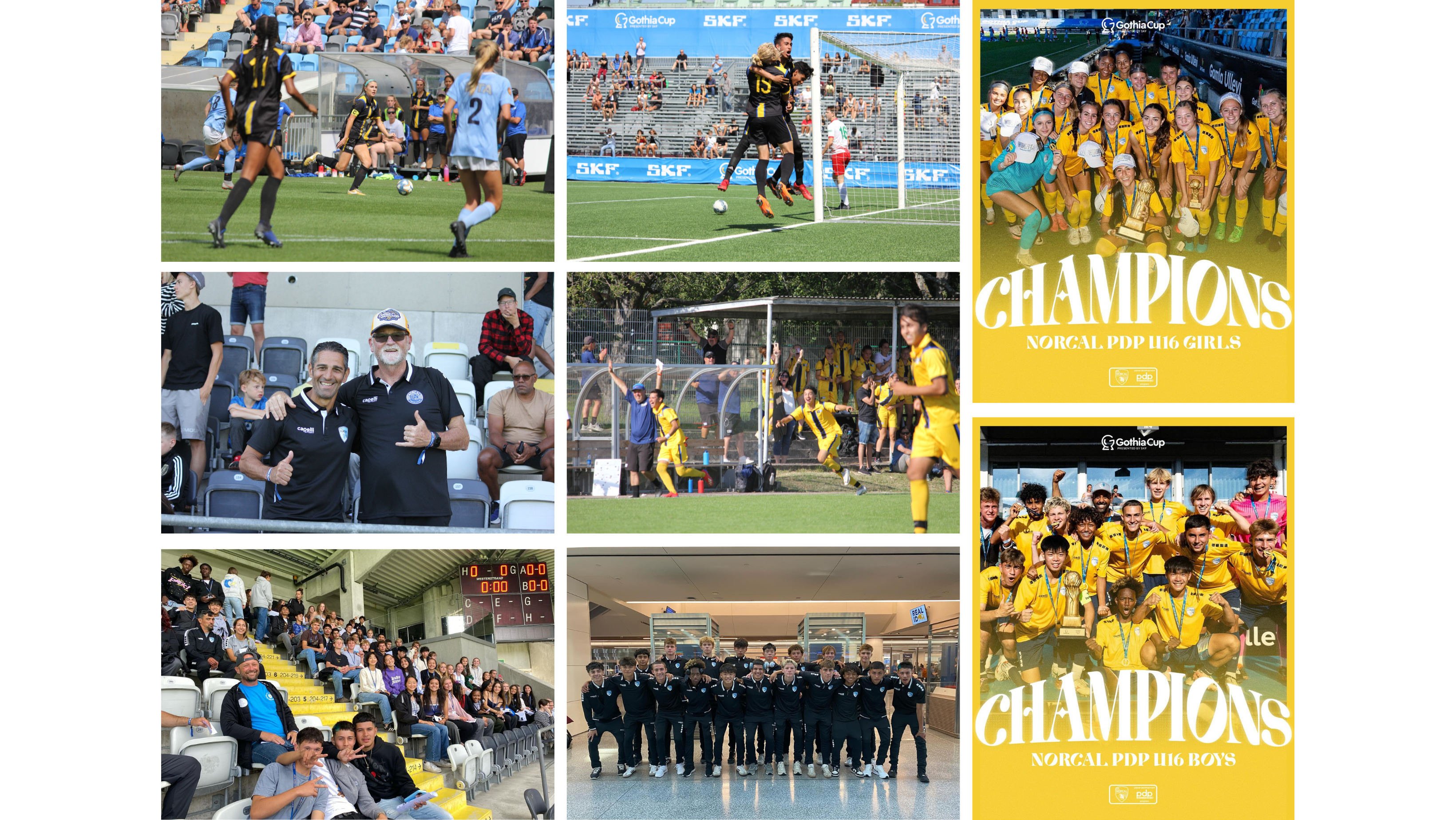
The boys began attending the Gothia Cup in 2018, winning the “B” Playoff while playing up an age group. Another strong showing in 2019 prompted tournament organizers to invite the boys to join the girls in the Puma Trophy in 2022 and 2023. In 2024, NorCal sent four NorCal PDP teams to Sweden for Gothia Cup —U17 Girls & Boys, U16 Girls, & Boys. Our journey resulted with both U16 groups winning their divisions and our U17 girls coming in second.
RECENT INNOVATIONS
Coming out of the COVID-19 pandemic, NorCal Premier Soccer returned to the fold with a series of exciting developments designed to modernize the youth soccer landscape. NorCal had organized State Cup for 18 years, but because of the size of California and the challenging logistics of traveling to Southern California, the Golden State wasn’t ever able to anoint a true cup champion. This changed in 2022 when NorCal brokered a deal with SOCAL Soccer League that led to the inception of the California Cup. While the event began modestly, plans are underway to expand it to the point where it’s one of youth soccer’s marquee events each year.
The California Cup, however, is just the tip of the iceberg when it comes to the NorCal-SOCAL partnership. SOCAL’s technical programs are led by Cris Gilmore, who helped his Bay Area club become one of NorCal’s first members before working for the organization in various different capacities starting in the late 2010s. When Gilmore moved down south during the pandemic, the two associations began collaborating on ways to improve the game for the entire state. In addition to sharing knowledge through correspondence, and the new combined competitions, the two entities embarked on their first joint coaching education trip in March of 2023. Through Gilmore’s leadership, 12 coaches from each association traveled to Guadalajara on a nine-day program featuring lessons from some of Mexico’s top youth development minds.
That trip came one month after NorCal launched its newest competition: the Futsal State Cup. A five-on-five, fast-paced variation on soccer, futsal was first invented in South America in the 1930s. While some of its rules differ from soccer, futsal proponents credit it for helping players develop close control, dribbling, and quick passing skills thanks to the conditions it’s played under. Several world class players such as Lionel Messi and Xavi credited the sport as a key component of their development and in recent years futsal has become more popular globally.
The first edition of the Futsal State Cup featured over 100 teams playing on six courts throughout one three-day weekend at COPA STC in Walnut Creek. In 2024, the number of participating squads grew by nearly 50 percent and NorCal was able to set up 10 different playing surfaces at Cal Expo in Sacramento. With more and more clubs adding futsal to their curriculum, NorCal is keeping with the times in offering its own competitions. “Our goal is to eventually expand our futsal programming to include a full winter season for teams to compete in over a longer period of time,” NorCal Director of Competitions Dan Chamberlain said at the most recent event. “This is just the beginning. We see a tremendous amount of value in the benefits that futsal provides for the development of players.”
When NorCal Premier Soccer first set up shop, it focused on the competitive aspect of youth soccer as that’s what the three co-founders felt needed the most overhaul. However, with the organization’s continued growth, it has now expanded into helping re-develop the recreational side of play as well. This led to the hiring of Grassroots Development Manager Andrew Taylor and the formation of the Super Rec League and Super Rec Cup. The former competition is part of NorCal’s desire to give all players the opportunity to play in more than just a short fall season, while the latter now features as one of the most-anticipated events for recreational players.
As NorCal kicks off this Fall 2024 season, it has grown to 275 Clubs, 5800 Teams, and 125,000 players.
THE FUTURE
While NorCal Premier Soccer has achieved many of its goals over the past 20 years, there’s still a long way to go in delivering truly world class programming to its members. In search of that goal, NorCal will continue to learn and innovate until it is on par with the best youth associations across the globe. While that journey is certain to include more low-cost coaching education opportunities, a free Player Development Program, expanding partnerships with clubs and federations, and structuring leagues based on merit, the possibilities for the organization’s next cutting-edge developments are endless.
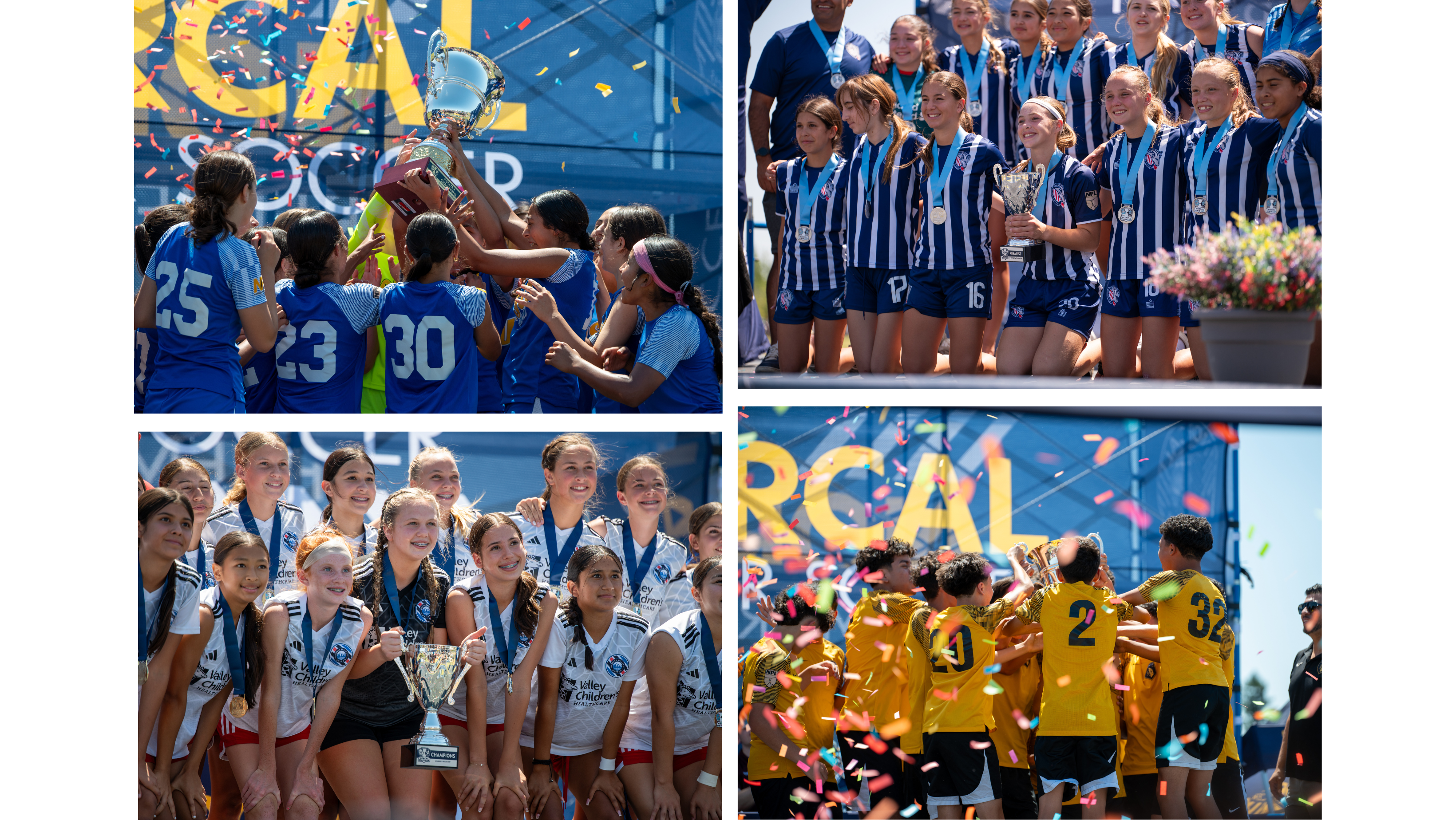
Regardless of what happens in the coming years, as NorCal enters its third decade, its values remain the same. NorCal still believes that the primary focus of a successful soccer program should be the individual players and their families. It believes in simple administration and balanced competitions. NorCal believes that players should play year round if they wish regardless of their family income status. It believes that development, whether for players, coaches, referees, administrators, or parents, is paramount in improving the local soccer landscape.
And lastly, as some may forget on occasion when caught up in intense games or training sessions, soccer should be fun. There’s a reason why the beautiful game is the most popular sport in the world and NorCal seeks to expand soccer’s reach and availability to every one of the region’s 15-plus million people.
“We have so much more to do to grow football in Northern California,” Ziemer said. “But I’m very excited for where we’re going.”
See you on the field.












